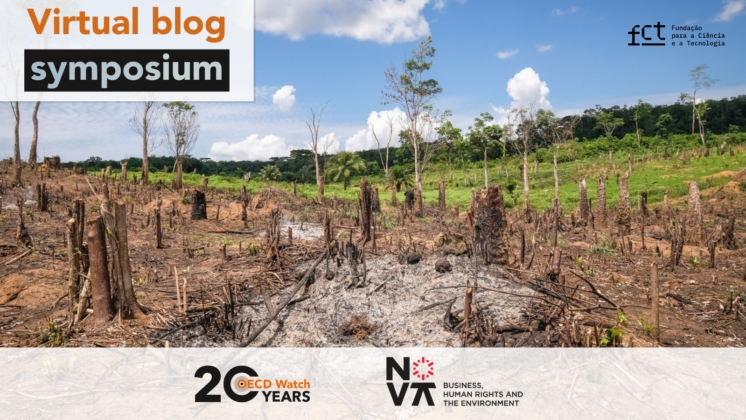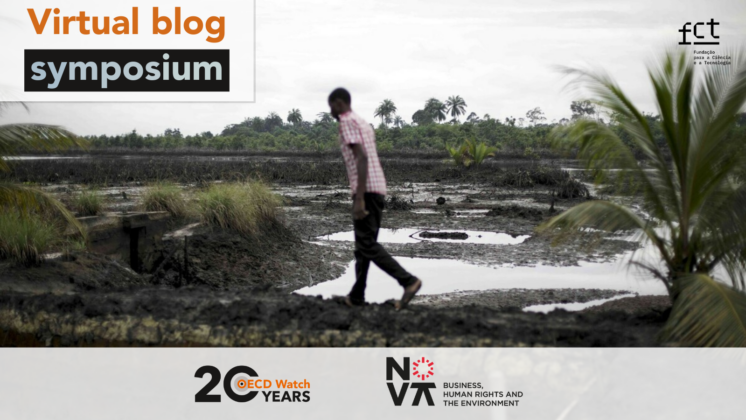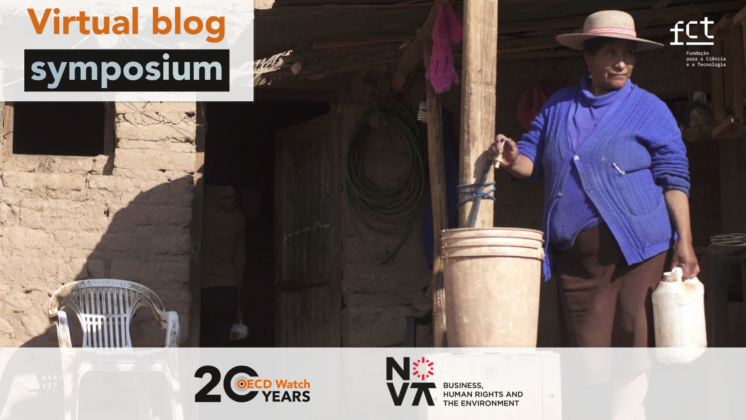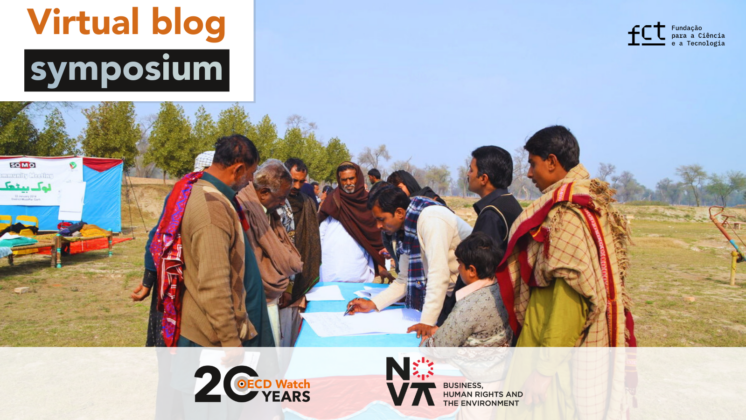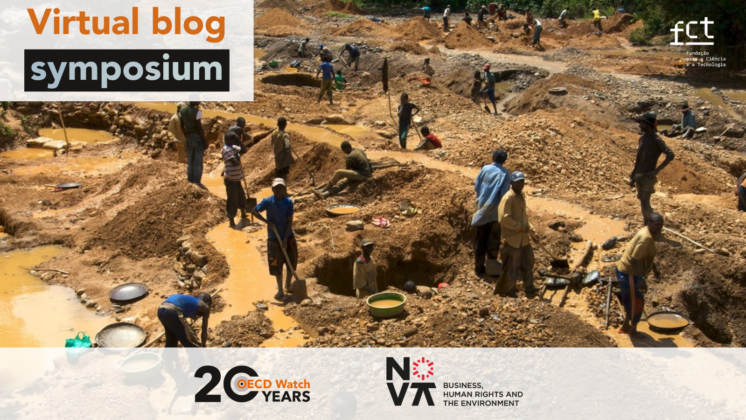By Otgontuya Davaanyam and Markus Krajewski
Blog symposium co-organised by OECD Watch and NOVA School of Law

According to the UN Guiding Principles on Business and Human Rights (UNGPs), States have a responsibility to protect individuals from human rights abuses within their territory and/or jurisdiction by third parties, including business enterprises, by taking appropriate measures to prevent, investigate, punish and remedy such abuses through effective policies, laws, regulations and jurisprudence. The Updated Guidelines 2023 of the OECD Guidelines on Multinational Enterprises (OECD Guidelines) also include some recommendations for governments regarding their responsibility to protect human rights from corporate misconduct through legislative and regulatory measures. In addition, in advance of the adoption of the Updated OECD Guidelines, the OECD adopted a Recommendation on the Role of Government in Promoting Responsible Business Conduct and the OECD Declaration on Promoting and Enabling Responsible Business Conduct in the Global Economy as guidelines for governments on how to promote responsible business conduct by companies in their territory and abroad. However, the new focus on the role of governments has received little attention so far. In this post, we discuss the important role of governments to assist multinational enterprises in adopting responsible business conduct, particularly with respect to the associated risks abroad, as added to the Updated Guidelines. In addition, we use 10 concrete cases handled by OECD National Contact Points (NCPs) to illustrate the main roles of governments: creating an enabling policy environment, effectively engaging and communicating with multinational companies and other stakeholders on responsible business conduct and promoting the role of NCPs in maintaining the environment for responsible business conduct by multinational enterprises.
Create an enabling policy environment to promote responsible business conduct
Paragraph 6 of the Preface to the Updated Guidelines emphasises that governments have an important role to play in supporting the effective implementation of the Guidelines, including the creation of an enabling policy environment that encourages, supports and promotes responsible business conduct. In addition, the OECD Recommendation provides a set of guidelines for governments to create an enabling policy environment through trade and investment policies, public procurement instruments and the setting of clear expectations by their government authorities with attractive economic benefits and incentives. While neither the Updated Guidelines nor the Recommendation contain legally binding norms on governments, they can be seen as soft law standards or tools to interpret existing state obligations in the field of business and human rights.
Specific instances of the OECD NCPs indicates the crucial role of governments in creating an enabling policy environment for companies to do business responsibly. For example, the Dutch and Norwegian NCPs have considered the commitments of the respective countries to human rights treaties when investigating human rights violations by companies based in their territory. In the case against the Dutch bank ING alleging adverse effects on climate change by the bank, the Dutch NCP analysed the case taking into account the Netherlands’ commitment to the Paris Agreement. Also, in the case against the pharmaceutical company Mylan concerning the supply of lethal injections to US prisons for the execution of the death penalty, as stated in the NCP’s final statement, the members of the Dutch Parliament and the Ministry of Foreign Trade and Development Cooperation took the allegation seriously and informed Mylan to comply with the Dutch CSR policy to avoid involvement in human rights violations anywhere in the world. They also claimed that the Netherlands considers the death penalty a significant violation of human rights and therefore advised Mylan to make contractual arrangements with its US partners to reduce the risk of its drugs being used in executions. At the end of the case, the Dutch NCP was pleased that shareholders and investors are using their influence and dialog to hold companies accountable for their responsible business conduct. In addition, the Swedish NCP, in cooperation with the Norwegian NCP, emphasized in its Final Statement on Statkraft’s allegations regarding the rights of indigenous Saami villagers that both Sweden and Norway have actively supported the relevant international instruments to protect the rights of indigenous peoples and that Norway has already ratified ILO Convention 169. Furthermore, it underlines that there is a contradiction between these state recognitions and the non-compliance with the OECD Guidelines by the Norwegian state-owned company Statkraft.
These cases demonstrate that strong commitment and willingness of states to adhere to international standards have an impact on the successful resolution of cases by NCPs. However, to increase the effectiveness of the regulatory and policy environment, the standards in the OECD Guidelines should be aligned with other international and national standards on responsible business conduct. For example, states should align mandatory human rights and environmental due diligence laws including the proposed EU Corporate Sustainability Due Diligence Directive (CSDDD) with the OECD Guidelines. Among NCP practises, some NCPs assess companies’ compliance with the OECD Guidelines in light of their own legal human rights obligations. The French NCP, for example, appears to attempt to link the NCP’s case handling system to its own binding human rights due diligence legislation by assessing compliance and implementation of the French Duty of Vigilance Act when evaluating the company’s responsible business conduct following complaints received by its NCP. In the cases involving the COPAGEF Group and Teleperformance, the French NCP assessed the vigilance plan of both companies in the context of human rights due diligence. In the case of Teleperformance, the French NCP paid particular attention to Teleperformance’s vigilance plan to assess whether it contained a sufficient policy and plan to protect the health and safety of workers during the Covid-19 period and provided concrete advice on how to improve the plan. These examples show that the NCP’s case handling system can complement the monitoring of mandatory human rights due diligence to better align the requirements for the implementation of human rights due diligence. This is a good example of how the NCP can act as a link between the OECD Guidelines and the responsibility of states to monitor their own national initiatives, such as mandatory human rights due diligence.
Engage effectively with business enterprises, civil society organisations and other stakeholders
The Updated Guidelines emphasise in paragraph 2 of the Commentary to Chapter II the importance of governments communicating and working effectively with business and other stakeholders to develop their voluntary and regulatory approaches. This provision highlights that business and other stakeholders, including civil society organisations and trade unions, should be important partners for States. Furthermore, the OECD Recommendation further elaborates on the important role of governments in facilitating stakeholder engagement and calls on governments to pay particular attention to small and medium enterprises (SMEs) and vulnerable groups, including human rights defenders and indigenous groups, by removing the barriers that prevent them from engaging in dialogue with others on the development of responsible business conduct.
While these recommendations are good, governments need to provide businesses more guidance on which stakeholders need special attention, should be more involved and in what circumstances, including extractive industries or other multinational companies operating in conflict-affected and high-risk areas. As Joan Carling argues here, for example, government guidance for multinational enterprises on how to engage with indigenous peoples need to be effectively carried out. Some OECD NCP cases can highlight some state practises on how governments should support companies operating in high-risk areas. For example, in the case against G4S at the UK NCP, G4S was accused of supplying security products to the Israeli government that were used for Israeli operations in the Occupied Palestinian Territories (OPT). The UK NCP pointed out that the UK’s Overseas Business Risk Information clearly states that the UK Government does not encourage commercial links with settlements in the OPT as these are illegal under international law and have negative consequences. As a result, the UK NCP recommended that G4S review its business behaviour with Israeli partners in order to address the adverse impacts mentioned in the complaint. In contrast, in the recent case against Mallee Resource Limited, the Australian NCP, in assessing the due diligence process of the mining company operating in Myanmar, found that the Australian government had provided little guidance to companies to conduct enhanced due diligence, particularly those operating in countries with ongoing military operations such as Myanmar. At the end of the case, the Australian NCP advised relevant government authorities to work closely with companies operating in conflict-affected countries such as Myanmar to provide specific guidance to companies on enhanced due diligence and responsible disengagement.
These cases demonstrate the importance of providing governments with concrete guidance on the areas and circumstances in which they should work more closely with multinational companies. The Danish NCP has done exemplary work in this respect by maintaining close contact with the companies operating in Myanmar since the expansion of military operations. This was demonstrated in the case against Bestseller in the Danish NCP, in which the company stated that it was in regular contact with the Danish Ministry of Foreign Affairs and other actors regarding the situation in Myanmar.
Promoting the role of National Contact Points in maintaining an environment for responsible business conduct by multinational enterprises
The Updated Guidelines emphasise the effectiveness of the NCPs in the Procedures that form the second part of the Guidelines. The Procedures encourage governments to use different structure of NCPs to fulfil the key effectiveness criteria and to involve different stakeholders in NCP operations to maintain meaningful engagement. Also, NCPs not only serve as a non-judicial mechanism to provide affected communities and stakeholders with access to redress, but also promote the effective implementation of the Guidelines. The updated Guidelines also added the new provision indicating that NCPs are encouraged to assist governments in developing, implementing and promoting coherence of policies (section D of I. National Contact Points for Responsible Business Conduct of the Procedures). The OECD cases show examples of some NCPs providing advice to states on the protection of human rights by business enterprises. For example, in the case against Dredging International in Belgium NCP, the NCP recommended that the relevant Indian authorities cease further operations of the Dhamra port project in India to address the negative impact on the environment and local communities. This was also done in the case against Van Oord, Atradius and Industrial Port at the Brazilian NCP, in which the companies are allegedly linked to human rights violations committed by Suape, a Brazilian state-owned company, through its investments. The NCP recommended that the Dutch Government raise awareness among Dutch financial institutions about the situation in the port of Suape and the negative impact on the interests and rights of traditional communities, including fisheries, and develop initiatives to promote corporate social responsibility in the Suape port and industrial complex. The importance of the role of NCPs in implementing and promoting responsible business conduct is undeniable, considering that they have the privilege of being confronted with a range of different information and situations related to human rights violations around the world through their case handling system. This needs to be further developed and encouraged so that NCPs can effectively support governments in fulfilling their responsibility to protect.
Conclusion
The updated provisions of the OECD Guidelines on the State Responsibility to Protect and the OECD Recommendation and OECD Declaration for Governments on Promoting Responsible Business Practises clearly demonstrate the importance of the role of governments in the effective implementation of the OECD Guidelines. However, as some OECD cases in this analysis show, the updated Guidelines could have provided clearer guidance to governments on the implementation of some specific measures. In particular, the creation of a favourable policy environment could have focused on aligning mandatory human rights due diligence laws with the OECD Guidelines. In addition, while government engagement with companies and other stakeholders was discussed, the focus could have been placed on what specific areas of co-operation and engagement could be further strengthened. For example, governments could work more closely with certain multinational companies operating in extractive industries abroad, particularly when operating in conflict-affected and high-risk areas. The Procedures for NCPs in the Updated Guidelines also emphasised the important role of NCPs in promoting the effective implementation of the Guidelines by supporting governments. Some OECD cases show the importance of such a role of NCPs, and it needs to be further promoted in all NCPs.
About the authors
 Otgontuya Davaanyam is a doctoral candidate at the Friedrich-Alexander-Universität Erlangen-Nuremberg. She is a researcher at the OECD Case Law Project and her doctoral thesis deals with the human rights and environmental responsibilities of multinational companies in the context of the OECD NCP specific instances.
Otgontuya Davaanyam is a doctoral candidate at the Friedrich-Alexander-Universität Erlangen-Nuremberg. She is a researcher at the OECD Case Law Project and her doctoral thesis deals with the human rights and environmental responsibilities of multinational companies in the context of the OECD NCP specific instances.
 Markus Krajewski is a professor at Friedrich-Alexander-Universität Erlangen-Nuremberg and holds the Chair of Public Law and International Law. Prof. Krajewski is one of the course directors of the MA in Human Rights and Chairman of the Interdisciplinary Research Centre for Human Rights Erlangen-Nuremberg (CHREN). He is also Chairman of the Board of Trustees of the German Institute for Human Rights and Secretary General of the German branch of the International Law Association. He is the lead researcher of the Corporate Human Rights Responsibility in the OECD Case Law, a project funded by the German Research Foundation.
Markus Krajewski is a professor at Friedrich-Alexander-Universität Erlangen-Nuremberg and holds the Chair of Public Law and International Law. Prof. Krajewski is one of the course directors of the MA in Human Rights and Chairman of the Interdisciplinary Research Centre for Human Rights Erlangen-Nuremberg (CHREN). He is also Chairman of the Board of Trustees of the German Institute for Human Rights and Secretary General of the German branch of the International Law Association. He is the lead researcher of the Corporate Human Rights Responsibility in the OECD Case Law, a project funded by the German Research Foundation.
About the blog symposium
2023 is a momentous year in the corporate accountability world. In June, not only did the OECD adopt key revisions to the newly renamed OECD Guidelines for Multinational Enterprises on Responsible Business Conduct, but the European Parliament also agreed on its position on the proposed directive on corporate sustainability due diligence. In recognition of these important events, NOVA BHRE and OECD Watch are co-hosting a blog symposium in October and November 2023 focused on the updated OECD Guidelines in the context of the current corporate accountability landscape.
The views and opinions expressed in this blog represent the views of the author and does not necessarily represent those of OECD Watch or NOVA School of Law.



